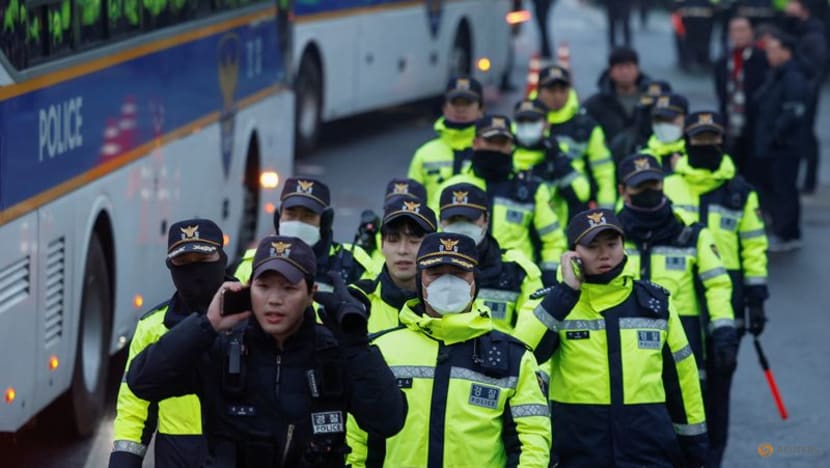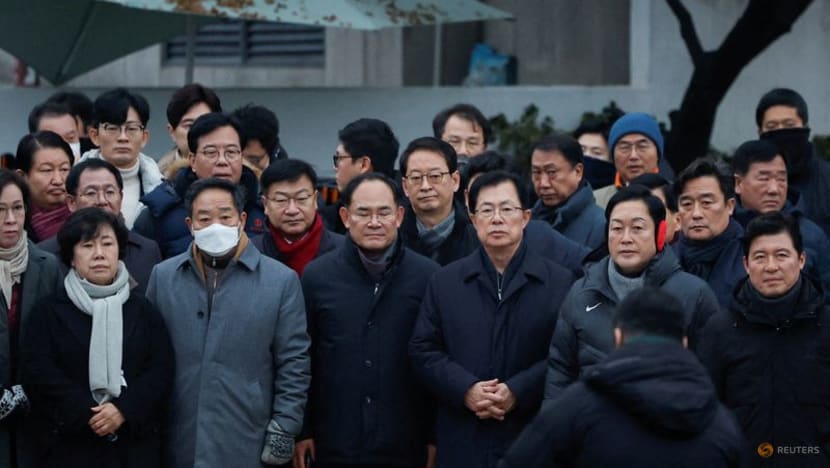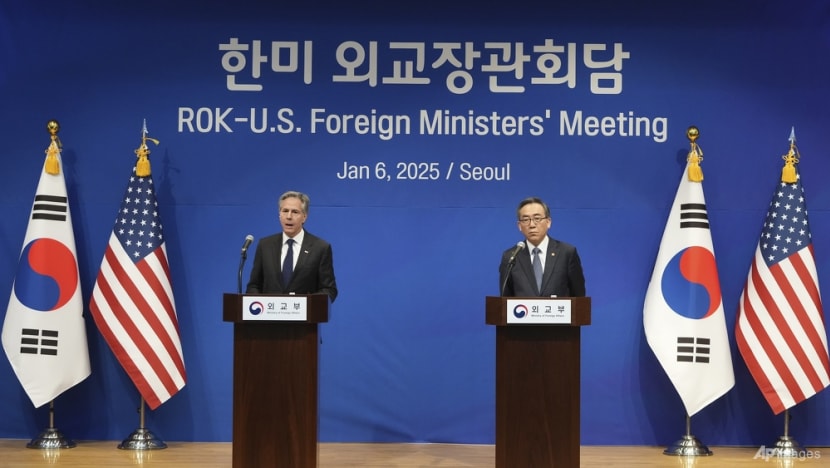South Korea investigators ask police to arrest Yoon

South Korea's anti-corruption agency said on Jan 6, 2024, that it had asked police to take over the execution of an arrest warrant for impeached President Yoon Suk Yeol. (Photo: REUTERS/Tyrone Siu)
SEOUL: Impeached South Korean President Yoon Suk Yeol appeared set to evade arrest ahead of a Monday (Jan 6) night deadline after anti-graft investigators asked for more time to enforce a warrant.
The former star prosecutor has refused questioning and defiantly holed up in his residence, with a failed arrest attempt last week leaving investigators trying to extend the warrant's Monday deadline and asking for help.
Anti-graft investigators sought an extension to the warrant that expires at the end of Monday, 12am (11pm, Singapore time) and asked for support from the police, which said the force would help investigators and could arrest anyone shielding Yoon.
"The validity of the warrant expires today. We plan to request an extension from the court today," aid CIO deputy director Lee Jae-seung, whose authority has been refuted by Yoon's lawyers.
The investigators have sought more time and help because of the difficulties they have faced, including being met by hundreds of security forces when they entered Yoon's presidential compound on Friday.
The country's opposition Democratic Party has also called for the dissolution of the security service protecting the impeached president.
If authorities detain Yoon, who has already been suspended from duty by lawmakers, he would become the first sitting president in South Korean history to be arrested.
But they would only have 48 hours to either request another arrest warrant, to keep him in detention, or be forced to release him.
Investigators can apply for a new warrant if the one which expires at midnight lapses without an extension being granted.
"COME AGAIN"
Yoon would then face prison or, at worst, the death penalty if convicted of insurrection over briefly suspending civilian rule and plunging South Korea into its worst political crisis in decades.
But both he and his supporters have remained defiant.
"The Presidential Security Service will protect the President, and we will protect the Presidential Security Service till midnight", said Kim Soo-yong, 62, one of the protest organisers.
"If they get another warrant, we will come again."
Under the fog of dawn, dozens of Yoon's lawmakers from the People Power Party turned up in front of his presidential residence and police blocked roads.
"I've been here longer than the CIO now. It doesn't make sense why they can't do it. They need to arrest him immediately," said anti-Yoon protest organiser Kim Ah-young, in her 30s.
The initial warrant was issued on the grounds that Yoon has refused to emerge for questioning over his martial law decree.
His lawyers have repeatedly said the warrant is "unlawful" and "illegal", pledging to take further legal action against it.
The vibrant East Asian democracy will find itself in uncharted territory either way – its sitting president will have been arrested, or he will have evaded court-ordered detention.

Experts said it is unlikely that investigators will get an extension on the Monday deadline.
Jay Song from Curtin University's Korea Research and Engagement Centre said it seemed like the CIO was "a bit too weak" to push forward with the arrest warrant.
The adjunct associate professor noted that Yoon's legal team will have to comply with the next warrant or if it is successfully extended, after the court said it was valid.
"It's likely that the (CIO) will hand over the power, the authority of the arrest to the police who has probably more proper and adequate forces to (be involved in the) next attempt to arrest the impeached president," Song said.
"But the interesting thing is, I was looking at some public polls in South Korea. The president's party - the ruling party, People's Power Party, PPP - is actually gaining support ... so it means that his legal team's approach and strategy to involve the public has been working," she added.
BLINKEN IN TOWN
US Secretary of State Antony Blinken arrived in Seoul early Monday for talks with several government officials in Seoul including acting president Choi Sang-mok, also finance minister.
He praised Seoul's democratic resilience but his focus was shifted away from domestic politics when North Korea fired what appeared to be an intercontinental ballistic missile into the sea as he met Cho.
A prosecutors' report for his former defence minister seen by AFP on Sunday showed Yoon ignored the objections of key cabinet ministers before his failed martial law bid, evidence the court may take into account.
It said the country's then prime minister, foreign minister and finance minister all expressed reservations about the potential economic and diplomatic fallout in a cabinet meeting on the night of the decision.

Sung-Yoon Lee, global fellow at US-based think tank Woodrow Wilson International Center for Scholars, pointed out that continuing Yoon's policies is a "matter of vital concern" for the US government.
"President Yoon has done arguably more than recent predecessors to reach out to Japan - Korea's colonial master in the first half of the 20th century," said Lee.
"And really, he has used his political capital to mend fences with Japan, the only other democracy in Northeast Asia which we know is a very rough neighborhood."
Lee told CNA938 that during Blinken's visit, both sides will "say the right things" along the lines of how both South Korea and the US are pro-democracy, and will continue to pursue "value-based diplomacy".
"But of course, even for Secretary Blinken, this is his farewell tour as the outgoing Secretary of State, with the new Trump administration coming in just in about a week or so. So things are in flux," Sung added.
South Korea's Constitutional Court has slated Jan 14 for the start of Yoon's impeachment trial, which if he does not attend would continue in his absence.
The country's opposition Democratic Party has also called for the dissolution of the security service protecting Yoon.
But Yoon's lawyers have pledged to wage their own legal fight.
His lawyer said on Sunday they would file another complaint against the head of the CIO who tried to arrest Yoon.
The president's legal team "intend to hold those who committed illegal acts strictly accountable under the law", lawyer Yoon Kab-keun said in a statement.
South Korea's Constitutional Court has up to 180 days to determine whether to dismiss Yoon as president or restore his powers.
Former presidents Roh Moo-hyun and Park Geun-hye never appeared for their impeachment trials.
















